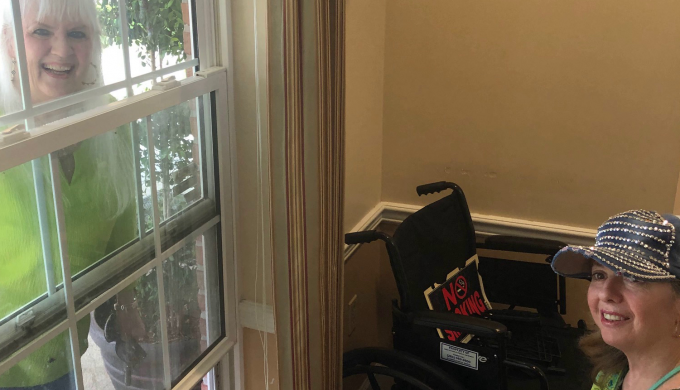I remember watching the TV sitcom “Cheers.” The weekly show featured a local bar in Boston where long-time friends met to socialize. The theme song for the program was, “Where Everybody Knows Your Name.” And they all did. They had perfect recall of names and the temperaments of their friends.
Perhaps, like the buddies in Cheers, you have a local hangout and enjoy get-togethers. Family and friends are necessary to healthy living, but how would you feel if your own name failed to come to mind? I can’t imagine the horror of forgetting my name, or loved ones, but here’s a thought to cause me greater panic. What if I forget who God is?
A disease like Alzheimer’s can make one powerless to remember Creator, friends, and family. This horrific illness has the power to rob one of memory and reduce a person to a living, empty shell.
I do not have this horrible disease, but our daughter does. I live with it through her eyes.
Photo: Gay Lewis
Today, in the United States, some five million people live with a form of dementia or Alzheimers, and the numbers are growing. For adults who make it past their 55th year, one in six women and one in ten men will acquire the disease in one of its forms. Young people, like our daughter, can acquire early-onset dementia. Symptoms begin to appear between the ages of 30 and 60. After diagnoses, most people live about eight years, but some live 20, and as the years go by, they can do nothing for themselves.
Millions of family caregivers are also affected by the ailment. I see our daughter struggle with normal activities—the kind we take for granted: eating, walking, dressing. My heart breaks.
Financial cost is another hardship. And the recent quarantine and isolation? Words are inadequate to describe the heartache. State authorities, with good intentions to keep vulnerable people safe, shutdown senior living facilities. Six months have gone by with these regulations in place. Our daughter in memory care doesn’t understand why I can’t come inside. I see her through a window. I explain. “We are protecting you from Covid-19, a virus.” In a recent, rare moment of cognitive competence, she said to me, “I think you don’t like me anymore because you won’t come inside.”
Photo: @vesnoi_ via Twenty20
On September 17, 2020, Texas Governor Greg Abbott announced changes were coming. I hope this means we can see our families in person again. While standing at the window, I’ve watched “essential workers” enter the building. The essential workers include people such as staff and medical personnel. However, no one is more essential to a resident than a family member.
I’ve joined several support groups from across the United States. We educate and encourage each other. Each state has varying regulations. Similar, but not uniform. These long-term protocols cause hardship.
Here are a few suggestions I sent to Governor Abbott.
- One designated family member, after testing negative, be allowed inside once a week. Require masks and other PPE, but at least one person permitted inside to hug and check on the care of the family resident.
- Designate one room for family visits. After the authorized family appointment, the facility sterilizes the room.
- Permit the residents to resume their normal routine. Eat in the dining room and visit with each other.
- If a resident comes down with Covid-19, remove the person to a unit specifically designed for the disease.
Photo: @porstocker via Twenty20
I’m the voice for our daughter. Others like me speak out on behalf of their family members. The shutdown for the vulnerable was necessary, but time has gone by, and common sense should now be applied.
Perhaps a time will come when my memory fails, but I find hope in remembering this: God’s mind never breaks down. He tells me in His Word that I’m worth more to Him than many sparrows. He also numbers the hairs on my head. My word! Curls come and go. Why would He need an updated headcount? God retains more information about me than Google accumulates, and Google knows a lot.
My daughter has four names, but she only remembers one. I know God recalls my name. Hers too. He records our names in His Book of Life when we become His family. The time will come when our daughter won’t know me, and she’ll forget who God is. No matter, God loves her, and so do I.
Photo: @katiabiruk via Twenty20
I’m often asked how someone can help. Here are a few suggestions.
Once restrictions are removed, visit the facilities, but keep visits brief. Patients with dementia have short attention spans. Share the events of your day. Take homemade food. Send cards. Call on the phone. Write officials with suggestions for opening the facilities. Let officials know you are aware of the needs of these dear ones.
We can’t explain why disease and hard times come. Only God knows why. Our choice is to remain faithful to Him and to the person who hurts and help where we can.
Gay N. Lewis is a Texas pastor’s wife, an author, speaker, and mother. Lewis’ novels are available on Amazon http://amzn.to/2hwc6nB, and other online bookstores. She can be contacted via her blog, or email at [email protected]. The views expressed are those solely of the author.







